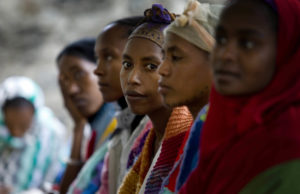

African women have experienced inequality in many aspects of life throughout history. Today, some of the largest risks African women face are human trafficking and gender-based violence. These risks are prevalent in underdeveloped areas where women are more likely to have lesser access to education and formal job opportunities. According to a 2005 article in the U.N.’s African Renewal, the majority of impoverished people in Africa are women. Thus, violence against women and modern-day slavery are two major consequences of poverty in Africa today.
The largest group of human trafficking victims across the world are between the ages of 9 and 17. Most female trafficking victims fall within the 18-20 age group. According to the African Sisters Education Collaborative, 9.24 million people in Africa are currently victims of modern-day slavery. This is 23% of the world’s population of modern-day slaves. In addition, over half of all human trafficking victims in Africa are under the age of 18. The majority of African human trafficking victims are female. Moreover, sexual exploitation makes up over half of all human trafficking exploitation in Africa. The exploitation of victims frequently lasts for less than a year. However, some victims reported experiencing exploitation for up to 16 years.
Female genital mutilation or cutting (FGM/C) is a traditional practice that has occurred in at least 28 African cultures throughout history. Additionally, over 120 million women and girls are victims of genital mutilation across the world. Despite violating international human rights laws, FGM/C often goes unreported within African countries. This is due to its prevalence and importance in cultural traditions. According to the Translational Andrology and Urology article, a nonmedical practitioner often performs FGM/C. The aim of this practice is to fulfill religious or cultural rites and sometimes for economic benefits.
Domestic violence is another alarming issue that is prevalent across Africa. A third of all African women had experienced physical or sexual domestic violence. In addition, every eight hours a domestic partner kills a woman in South Africa. Around 51% of African women experience beatings from their husbands. This happens when women go out without permission, neglect the children, argue back, refuse to have sex or burn the food.
Many African countries accord equal rights to women in their current constitutions, such as Uganda, South Africa and Kenya. The African Union (AU) recognizes the “critical role of women in promoting inclusive development” in Article 3 of the Protocol on Amendments of the Constitutive Act of the AU. Additionally, the Protocol to the African Charter on Human and Peoples’ Rights on the Rights of Women in Africa lays a foundation for African governments to follow to promise equal rights to their female citizens. The document also protects women against gender-based violence and empowers women to fulfill their potentials within society.
Women received the right to vote in many African countries throughout the 20th century. Since then, many African governments have increased the number of women they allow in leadership roles and governmental positions. Some African countries, like Uganda, require by law that a certain number of government positions and organizations’ leadership roles be allocated specifically for women. This is similar to the United States’ Equal Employment Opportunity Commission. Countries like Rwanda criminalize violence against women in domestic violence laws. However, there is a low circumstance in enforcing and implementing these policies due to cultural traditions. In addition, the village or family institution is informally superior to law enforcement.
The United Nations adopted the Convention on the Elimination of All Forms of Discrimination Against Women (CEDAW) in 1979. Since then, the CEDAW has worked to encourage African countries to “commit themselves to undertake a series of measures to end discrimination against women in all forms.” Ninety-nine countries around the world have ratified the CEDAW since 1980.
Eliminating the risk and existence of human trafficking is also a major part of female empowerment and keeping women safe in Africa. Educating women, showing them their potential for formal job prospects and warning them against the signs of engaging with human trafficking can prevent human trafficking.
Few sub-Saharan African countries have successfully addressed gender-based violence issues. Hence, bridging the gap between policy and practice across Africa will help end human trafficking and violence against women.
Government leaders, nonprofit organizations, international allies and citizens alike will need to unite to protect and empower all African women.
– Myranda Campanella